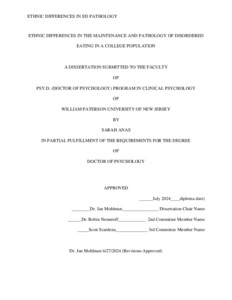Please use this identifier to cite or link to this item:
http://hdl.handle.net/20.500.12164/3453| Title: | Ethnic Differences in the Maintenance and Pathology of Disordered Eating in a College Population |
| Authors: | Anas, Sarah |
| Keywords: | Psychology;Eating disorders;Perfectionism;Self-esteem |
| Issue Date: | 8-Jul-2024 |
| Publisher: | William Paterson University |
| Abstract: | College students are one of the most vulnerable groups for developing disordered eating (e.g., restricting food intake, purging, binge-eating). Moreover, eating disorders have often been considered a ‘White woman’s disease,’ and research of EDs on minority populations has been limited. Because of this, it is crucial that we gain a deeper understanding of the role ethnicity plays in the pathology and maintenance factors of eating disorders in a college student population. The current study utilized the transdiagnostic model (TM) of eating disorders to conceptualize and measure eating pathology. The TM proposes that there are four maintenance factors for disordered eating: mood intolerance, interpersonal problems, perfectionism, and low self-esteem. The present study examined differences between White and Latina women in the relationship of the four maintenance factors to disordered eating pathology (n = 131). It was predicted that these populations would differ in endorsed symptoms of eating pathology, as well as in the severity of symptoms of eating disorders. The study also tested ethnicity as a moderator in the relationships between each maintenance factor and overall eating pathology, as measured by the Eating Pathology Symptom Inventory (EPSI). Contrary to predictions, no significant differences were found in overall eating pathology or disordered eating presentation between the groups. The trait of perfectionism was found to correlate significantly and positively with eating pathology across the entire sample. Unexpectedly, self-esteem and emotion regulation correlated significantly and positively with eating pathology. Ethnicity did not moderate the relationship between the maintenance factors of EDs and overall eating pathology. Results showed no significant differences in the presentation of disordered eating across the two ethnic groups. Findings also challenged the expected direction of emotion dysregulation and low self-esteem, as they relate to eating pathology. Future research should explore the relation of ethnic identity and acculturation on eating pathology. |
| URI: | http://hdl.handle.net/20.500.12164/3453 |
| Appears in Collections: | Theses & Dissertations |
Files in This Item:
| File | Description | Size | Format | |
|---|---|---|---|---|
| Anas_EDPathologyEthnicDifferences.pdf | 326.24 kB | Adobe PDF |  View/Open |
Items in DSpace are protected by copyright, with all rights reserved, unless otherwise indicated.
